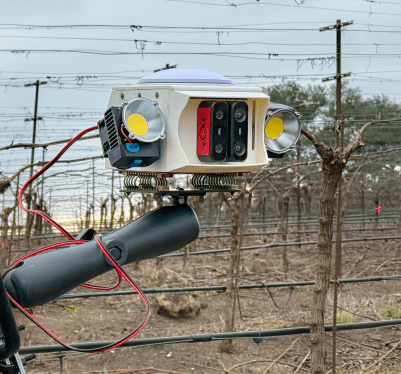Inspired by his grandparents, who were apple farmers in China, Charlie Wu first conceived the idea of applying technology to agriculture while studying computer science at Cornell University, a top-ranked agriculture school. During his time there, he met world-renowned fruit professors. Through conversations with them, Wu realized that even the largest farms in the nation often had no real insight into what was actually growing in their fields.
Wu made the decision to drop out of Cornell and became a Thiel fellow. In 2022, he began building Orchard Robotics, a startup that uses advanced cameras and artificial intelligence to help fruit growers manage their crops with much greater precision.
This past Wednesday, Orchard Robotics announced it has raised $22 million in a Series A funding round. The investment was led by Quiet Capital and Shine Capital, with participation from returning investors General Catalyst and Contrary.
While the concept of using computer vision for specialty crops is not new, Wu points out that the largest farms in the United States still depend on manual sampling to make critical decisions about their operations. Because farmers can only physically inspect a small percentage of their crops, their estimations of the total healthy fruit yield can be extremely imprecise. This lack of accurate data creates significant challenges. Without knowing what is growing in the field, farmers cannot determine the correct amount of chemicals to apply, how many workers to hire for the harvest, or what they can actually sell to market.
Orchard’s solution involves a small camera that attaches to tractors or other farm vehicles. As the operator drives through the field, the device collects ultra-high-resolution images of the fruit. This visual data is then analyzed by AI algorithms to assess critical factors like fruit size, color, and overall health.
The analyzed information is uploaded into Orchard’s cloud-based software, which serves as a central record to guide decisions. It helps identify which specific vines or trees may need extra attention, such as additional fertilization, pruning, or thinning.
Orchard’s technology is already being used by some of the country’s largest apple and grape farms. The startup has recently expanded its offerings to serve growers of blueberries, cherries, almonds, pistachios, citrus, and strawberries.
The company is not alone in this space. Its direct competitors include Bloomfield Robotics, which was acquired last year by farm equipment manufacturer Kubota, as well as seed-stage startups Vivid Robotics and Green Atlas.
Wu acknowledges that the current market for fruit and vegetable data is valued at only $1.5 billion. However, he believes future advancements in AI will allow the technology to progress from simple data collection to making autonomous decisions, thereby significantly expanding Orchard’s potential product offerings.
He hopes Orchard’s evolution will mirror that of Flock Safety, a public safety startup now valued at $7.5 billion. That company expanded from simply collecting license plate information to offering a full suite of products including gunshot detection and video surveillance. Similarly, Wu’s ambition is for Orchard to be much more than a data collection service. The goal is to collect the data, build an operating system on top of it, and eventually own all the workflows on the farm, which has the potential to expand their market substantially.

